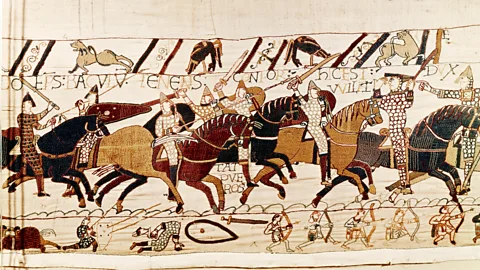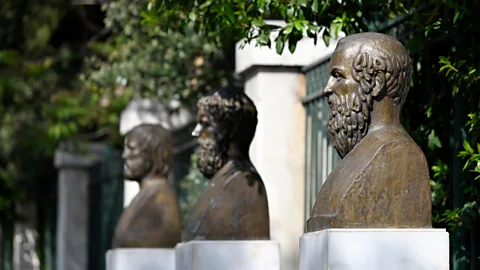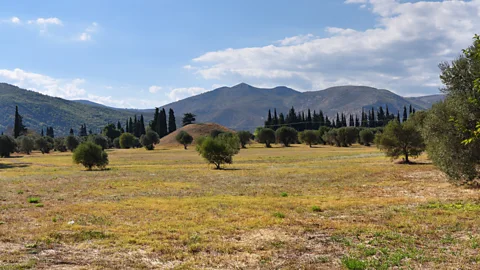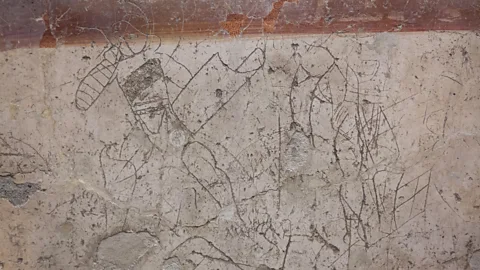How ancient civilisations dealt with trauma
 Alamy
AlamyAs the conflicts in Gaza and Ukraine continue, there’s deepening concern for the trauma that may come later. But war has been around for millennia. How did our ancestors cope?
The attacker approached from behind. His victim was a muscular middle-aged man with missing teeth – possibly a hardened English fighter, who had already sustained a serious head injury years before. The Norman soldier lifted his heavy double-edged sword, and struck a blow near his target's right ear. He didn't stop. In a frenzy of slashing movements which gouged the Englishman's skull, the victim fell. And there his bones would lie, on the slope of a hill in Sussex, for nearly 1,000 years – that is, until they were discovered under a school by archaeologists in 1994.
The original proprietor of "Skeleton 180" is thought to have died during the Norman invasion of England in 1066. If this is the case, his bones are the only human remains ever found from this conflict. But though the physical relics from this violence have mostly dissolved into the region's acidic soil, the evidence of its psychological impact has lingered on in an obscure medieval document.
The oldest war in recorded history occurred in Mesopotamia in 2700BC, between the long-vanished civilisations of Sumer and Elam – and despite the occasional burst of relative peace, such as at the start of the 21st Century, war has loomed over our species ever since. As you would expect, our ancestors weren’t immune to the psychological effects of all this death, just as they aren't today. But in the absence of modern treatments, many ancient societies developed their own ingenious methods of coping with trauma – from religious justification to purifying rituals or even immersive plays. What can we learn from these practises?
Medieval Europe – cleansing rituals
Just a year after the Norman conquest, a group of bishops got together to create an unusual list. The Ermenfrid Penitential records a set of instructions for those who had participated in the bloodshed – setting out the repentant actions they should perform to atone for their deeds. There are specific penances for every circumstance – whether soldiers had committed rape, killed someone, inflicted a wound, or didn't know the number they had slain. If he survived, the soldier responsible for Skeleton 180's wounds would have had to perform penance for a whole year.
This medieval document was no ordinary act of compassion. It's now thought that the penitential may have been an attempt to absolve the Norman soldiers of "moral injury" – the distressing consequences of acting in a way that goes against one's moral values.
"It is clear that medieval fighters knew trauma was a possibility," says Kathryn Hurlock, a senior lecturer in medieval history at Manchester Metropolitan University.
Battles in the Middle Ages mostly involved close combat, a butchering style of fighting that led to gruesome injuries and sometimes thousands of deaths in a single day. Even the Bayeaux tapestry – a 68m (224ft) medieval masterpiece that tells the story of the Norman invasion – contains harrowing scenes. As the Norman and English armies clash with battle axes, swords, clubs, spears, bows and lances, the carnage spills over into the fabric's margins; speared horses tumble down, soldiers pull armour from naked corpses, and the count of dismembered heads and other body parts racks up.
However, evidence for the psychological impact all this violence is sparse – partly because medieval records tend to be either heroic tales or factual accounts of events, says Hurlock. "First person accounts by combatants are uncommon, and self-reflection is virtually non-existent," she says.
But there are some clues. Take the Book of Chivalry, a combat manual written during the Hundred Years War by one of the most famous knights of the era. As well as providing practical instructions for fighting techniques, the author warns of the types of things that today we would recognise as causing trauma, says Hurlock, writing of "great terrors" even when knights weren’t in immediate danger. Other records from the time even mention specific symptoms, such as fear, shame and betrayal, she says.
 Alamy
Alamy"There were expectations about what should and shouldn’t happen in war, such as taking captives for ransom, and when those expectations or 'rules' were transgressed people seem to have been more likely to suffer some kind of trauma," Hurlock says. Enter moral injury, a kind of psychological wound that seems to be universal – affecting warriors in many different human cultures across thousands of years, from medieval Christians to modern-day Vietnam War veterans.
To help veterans avoid trauma and give them tools to deal with it, medieval societies relied heavily on religion. There were prayers and blessings from priests before battles, and penances allowed veterans to absolve themselves of any atrocities they had committed. Later, during the Crusades, people were told that entering into war was a holy act itself, and could do away with all your previous transgressions, says Hurlock.
Ancient Rome – special permission and gladiatorial matches
The chickens may have been a bit seasick. It was 264BC in the harbour of the Sicilian city of Drepana, and the Romans were poised to attack a fleet of ships belonging to their enemy, the Carthaginians. The army's commander was performing the pre-battle ritual to determine if the gods were in their favour – all they had to do was release a batch of sacred chickens from their cage, and coax them to eat some grain. The more greedily they pecked, the more auspicious the prediction.
The problem was the Romans were in a bit of a hurry. So, rather than perform the ritual before the boats were launched, on the beach, the commander insisted that it should happen on the boat. The chickens flat-out refused to eat, and he threw them into the sea in a rage. The army promptly lost.
The Roman commander had made an elementary mistake. "Soldiers have always been superstitious, and the Romans were no exception," says Barry Strauss, a professor in humanistic studies at Cornell University, New York. Not only would this omen have undermined the army's confidence going into battle, but it would have potentially made their experiences more traumatic afterwards, he says.
In fact, the Ancient Romans invested heavily in getting the proper permission from the gods for their wars. "The Romans were very legalistic people," says Strauss. They only considered defensive war to be acceptable and had each conflict approved by a special committee of priests, the fetials. "And of course, it's absurd, the Romans spent centuries conquering an empire so of course they engaged in aggression. But the fetials always insisted that what was going on was defensive and that war was justified," says Strauss.
 Alamy
AlamyThis was important, because Roman warfare was particularly brutal and gruesome for the fighters involved. While Ancient Greece had hoplites – heavily armed foot soldiers who moved in a phalanx formation and thrusted at their enemy with 8ft (2.4m) spears – the Roman strategy was at much closer range. They fought with the gladius, a kind of short sword. "It's been compared to a machete or cutlas," says Strauss, who suggests that it would have been harder to hide the horror of what was happening. "We hear about soldiers from Roman battles wading through blood, there was a danger of slipping because there was so much blood," he says.
But the Romans had another way to prevent soldiers from being traumatised: gladiatorial games. These gory spectacles were often excused as a way of inuring young men to violence, says Strauss, and the general public loved them. "We find souvenirs of gladiatorial games all over the place, from one end of the empire to the other, and in Pompeii, there are graffiti from the fans of gladiators," he says. "And we know that some of them were by children because they're written at a very low level where children can reach," he says.
However, Strauss isn't convinced that these strategies were entirely effective at preventing trauma. "The ancient world is full of admonitions – don't run away from battle – which tells us that people did run away from battle because it was just so terrifying," he says.
Ancient Greece – immersive plays
Roughly 25 miles (40km) northeast of Athens is a grassy plain. This tranquil spot, which today is swathed in wildflowers and surrounded by pine and olive trees, is where – one autumn day in 490BC – more than 6,000 ancient warriors met their doom at the Battle of Marathon.
The tragedian and military veteran Aeschylus was there that day, part of the ancient Greek army who charged towards an invading Persian force. In later life, he went on to write around 90 plays, though only seven survive – many of which describe the aftermath of these conflicts, including psychological trauma.
In fact, Aeschylus was renowned as a soldier. After he died, the epitaph on his grave didn’t mention his work as a dramatist, instead highlighting his valour in battle. One translation of his exploits reads: "The famous grove of Marathon could tell of his courage and the longhaired Mede [a Persian warrior] knew it well."
 Getty Images
Getty ImagesPeter Meineck, professor of classics in the Modern World at New York University, believes that the Ancient Greeks used dramatic plays as a form of catharsis, which helped veterans to process these experiences. In fact, there is a long tradition of viewing the epic poem The Odyssey, which was written by Homer, as a book about combat stress.
Aeschylus' plays are unusual in that he wasn't just dramatising distant or mythological events. In The Persians, he writes about what happened after Battle of Salamis in 480BC, which he fought at. "He really shows empathy for the enemy," says Meineck.
The Fifth Century was a time of bloody conflict in the classical world, with the Persian Wars and the Peloponnesian War happening almost back-to-back. "One could describe the Fifth Century as a time when there was war, and occasionally peace broke out," says Meineck. Battles were gory and frightening. "You're going to get impaled by a spear, you're going to get pushed to the ground with a sword, or you're going to be serving in a ship, which basically crashes into another ship, and you hope you survive… it was terribly, terribly brutal," he says.
In Meineck's opinion, the combat stress this led to is evident in records from the era. He cites one historian's account of the Sicilian Expedition, an Athenian military campaign which started in 415BC. The army had to leave in a hurry, and couldn't take their wounded with them – though they begged not to be left behind. "This is a very traumatic description and any human reading that is going to see how powerfully that affected the survivors," he says.
The Battle of Marathon even led to a curious story which some experts view as an account of psychological trauma – though this is controversial. Hundreds of years after the clash, a Greek historian wrote about a man who had been fighting at the battle, when suddenly he saw a towering, phantom-like figure with a beard so large it overshadowed his shield. This apparition brushed past him and killed the man next to him instead; from that day onwards, though he had no physical injuries, he was completely blind.
 Alamy
Alamy"[Ancient] Greek society was a ritualised society," says Meineck. Before the Battle of Marathon, Athenians promised to sacrifice one goat for each Persian they killed to the goddess Artemis – though in the end, they didn't have enough goats. When veterans returned, they might sign up for the Eleusinian Mysteries – top-secret rituals which promised to make people content, though what they involved is utterly elusive to this day.
Tragic plays were an extension of this culture. In Athens, plays were only staged in the winter and the spring, in the intimate setting of a small outdoor theatre. It was an immersive experience under the sun – often with a mythological narrative that people would have been deeply affected by. "That's hard to replicate [today]," says Meineck.
However, that hasn't stopped Meineck giving it his best shot.
After working with veterans from Iraq and Afghanistan, Meineck launched the Warrior Chorus Project, an initiative that helps people to process their trauma using ancient literature. He explains that these plays couldn't be more suitable for those returning from war in modern times; "They were [originally] written by combat veterans and performed by combat veterans, for an audience of combat veterans," he says.
But what of the trauma of civilians? In the ancient world, as today, war often spilled over into the world of the general public – leading to rape, torture, slavery, theft, murder and the mass displacement of people, with entire cities razed to the ground. "When an army came to attack a city, if they surrendered, then the civilians would be largely left alone," says Strauss. "If the city however, resisted, and the city was taken after a siege or right away by assault, then unfortunately, everybody in it was fair game," he says.
Like with combat trauma, the ancient Greeks dealt with the psychological impact this had through poems, plays and rituals. "We hear a lot about women and children suffering in [Homer's epic poem] the Iliad," says Strauss.
In Meineck's opinion, we have a lot to learn from the way the Ancient Greeks coped with trauma. "I think we need to come together collectively, and experience it together," he says. "I think we need to be moved by the stories of others. And I think we need to open ourselves up for catharsis… if we can do that, then we can [start to] heal ourselves."
--
If you liked this story, sign up for The Essential List newsletter – a handpicked selection of features, videos and can't-miss news delivered to your inbox every Friday.
